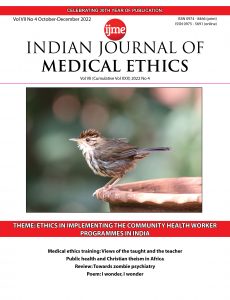
With an army of community health workers, almost a million strong and active for over two decades, India’s ASHA programme is the largest in the world. An army is known to march on its stomach; but how healthy is that stomach? Is the army’s performance optimal? If not, what are the ethical factors that need urgent attention? The authors of this Theme issue have probed some aspects of the community health worker programmes in India, including the professional ethics of a senior health worker, the adequacy of the training model, specific challenges facing community mental health workers, and the system’s overall sustainability.
An editorial and a comment outline the regressive effects of religious orthodoxy on health and human rights — in the overturning of abortion rights in the US, and more pervasively, in the inequitable handling of the pandemic in parts of Africa. How effectively can medical ethics be taught? Two studies from Kenya and rural India report their findings on this perennial subject. Two newly minted doctors reflect on challenges faced — one in an urban intensive care unit, the other in rural Kerala. A rich array of reviews, letters, and a poem take us through varied and sensitive issues.
The journal has just completed its thirtieth year, and hopes to continue highlighting and promoting healthcare ethics, human rights and humanities, with your support, for decades to come.
__________________________________________________________________________________________________________
Cover credit: Little things make mighty nature, courtesy of Dr Uma Kulkarni
